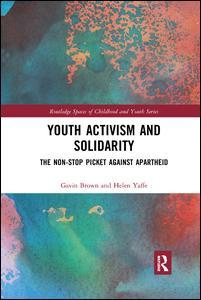Description
Youth Activism and Solidarity
The non-stop picket against Apartheid
Routledge Spaces of Childhood and Youth Series
Authors: Brown Gavin, Yaffe Helen
Language: English
Subject for Youth Activism and Solidarity:
Keywords
Non-stop Picket; Apartheid; Young Men; Apartheid South Africa; South African Trade Union Movement; Apartheid-era; SACP Central Committee; City of London Anti-Apartheid Group; City Group; Gavin Brown; South African Embassy; Geographies of Youth; Pop Stars; Helen Yaffe; City Group Activist; Social movements; UK Uncut; Youth Studies; Anti-apartheid Campaigning; activism; Young Picketers; anti-apartheid; Cannon Row Police Station; anti-racism; Anti-apartheid Solidarity; anti-racism movement; City AA; building solidarity; Labour Party Black Sections; cultural geography; South African Liberation Movements; geographies of activism; London Anti-Apartheid Group; geographies of race; Post-apartheid Settlement; non-stop against apartheid; City Group Members; practices of activism; South Africa House; protest; radicalism; social geography; social history; youth activism; youth solidarity; youth-led social change
Publication date: 02-2019
· 15.6x23.4 cm · Paperback
Publication date: 10-2017
· 15.6x23.4 cm · Hardback
Description
/li>Contents
/li>Readership
/li>Biography
/li>
From April 1986 until just after Nelson Mandela?s release from prison in February 1990, supporters of the City of London Anti-Apartheid Group maintained a continuous protest, day and night, outside the South African Embassy in central London. This book examines how and why a group of children, teenagers and young adults made themselves ?non-stop against apartheid?, creating one of the most visible expressions of anti-apartheid solidarity in Britain.
Drawing on interviews with over ninety former participants in the Non-Stop Picket of the South African Embassy and extensive archival research using previously unstudied documents, this book offers new insights to the study of social movements and young people?s lives. It theorises solidarity and the processes of adolescent development as social practices to provide a theoretically-informed, argument-led analysis of how young activists build and practice solidarity.
Youth Activism and Solidarity: The Non-Stop Picket Against Apartheid will be of interest to geographers, historians and a wide range of other social scientists concerned with the historical geography of the international anti-apartheid movement, social movement studies, contemporary British history, and young people?s activism and geopolitical agency.
1. South Africa and Britain in the 1980s 2. A non-stop protest in a non-stop world 3. Becoming non-stop 4. Being non-stop against apartheid 5. Defending the right to protest 6. Being unruly 7: Growing up through protest 8. ‘Until Mandela is free…’ 9. Lessons and reflections
Gavin Brownis an Associate Professor in the School of Geography, Geology and the Environment at the University of Leicester, UK. He is a cultural, historical and political geographer with an interest in protest movements, solidarity, and the geopolitics of sexual orientation and gender identity.
Helen Yaffe is a Lecturer in Economic and Social History at the University of Glasgow. She has focussed on Cuban economic history, political economy, Latin American development and the history of economics.

